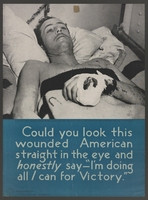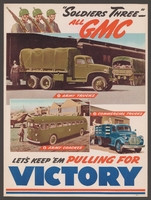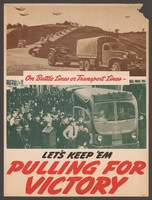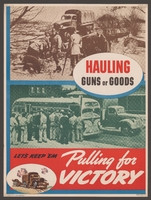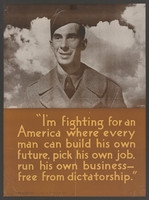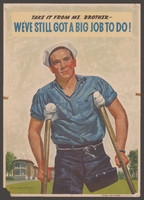Old Joe said to young Joe . . .
ポスター番号/No. of Poster:44
主題/Subject:Business
内容記述・解説/Description:Old Joe said to young Joe . . . / “. . . when you get over there in the thick of it, son, you won’t have time to think about the fancy ideals you’re supposed to be fighting for. You’ll be interested mostly in shooting straight, and shooting first. / “But some night when you’re lying out under the stars, you’ll probably figure the whole thing out—and it will be very simple. / “You’ll realize that you’re fighting to protect the kind of decency and freedom you were raised in—and will want to raise your kinds in, too. / “You’ll be fighting to protect the opportunity that all Americans have of starting at the bottom and getting to the top—and that’s typically American. / “You’re fighting to protect your right to live your own life in your own way without being pushed around by some bright young bureaucrat who wants to do all your planning for you. / “That’s about all there is to it, son. But it’s mighty worth while—this business of keeping our freedom—of sticking to the things that have made America great. / “I’ve often thought that our own family was a pretty good example of what can happen in this country—and nowhere else. I started doing odd jobs in this very hardware store, when I was ten years old. Made up my mind I’d own it some day. Nothing in the world to stop me—if I really wanted it. / “We didn’t have cars and trucks and airplanes in those days. No radios. No telephones, movies, or electric lights. / “I didn’t have much education—didn’t have the time or money to get it. But I made up my mind that my own children would have some of the things I didn’t have. / “You’ve had a good education. You went to college. You’ve traveled around the country in your car. You’ve seen how the other fellow lives. You keep up to date through your radio and your reading. / “And, son, it’s hard to believe that most of the inventions, advantages and improvements that have made you more efficient and more comfortable, have happened in my lifetime. / “But that’s the very thing I’m talking about. That’s the power of America. We’ve got push in this country—and ingenuity—the determination to keep on getting stronger and better all the time. / “And all of us have got to see that nothing stops that kind of progress—neither enemies from the outside, not from the inside. / “You’re a chip off the old block, son. You think about the way I do. You work hard—very hard. But you’ve had more advantages than I had. And you’re a better man in every way. You’ll go farther. / “Just remember this, my boy—you’re a free agent. Your future is under your hat. You have seen what our American way of doing things has meant to you and me and millions of others, in opportunity, progress and happiness. That’s what you’re really fighting for, son. You put the heat on, over there—and I’ll put it on over here.” / We all have “Young Joes”—brothers, sons, buddies—who are over there putting the heat on, for us. Let’s put the heat on over here, for them . . . by turning out the steel they need to win, and by everything humanly possible to speed up our final Victory. Millions who also want to keep America American will see this story in the February 12 Saturday Evening Post and other leading publications.
備考(ポスターにある記号等)/Note:Gift of Central Outdoor Advertising Co.
-
Faculty / Graduate SchoolGraduate School of Arts and Sciences / College of Arts and Sciences
-
Original OwnerCenter for Pacific and American Studies, Institute for Advanced Global Studies, Graduate School of Arts and Sciences, The University of Toyko
-
Data ProviderCenter for Pacific and American Studies, Institute for Advanced Global Studies, Graduate School of Arts and Sciences, The University of Toyko
-
Rightshttp://www.cpas.c.u-tokyo.ac.jp/lib/archive_riyo1.html
-
Metadata Rightshttp://creativecommons.org/licenses/by/4.0/

-
IIIF manifesthttps://da.dl.itc.u-tokyo.ac.jp/portal/repo/iiif/2e20e648-23d7-5c08-6c82-a658bd0548d2/manifest
Collection
-
CPAS WWII Propaganda Poster Collection
This collection features ninety U.S. propaganda posters produced during the Second World War. Center for Pacific and American Studies (CPAS) acquired these posters, originally housed at Stanford University, in 1983 through a Japanese contact.

